MercoPress. South Atlantic News Agency
Tag: United Nations Economic Commission for Latin America and the Caribbean (ECLAC)
-
Wednesday, November 23rd 2016 - 10:59 UTC
Partnership with Latin America and the Caribbean strategic for China
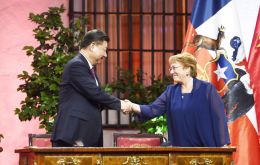
Chinese President said that his country's alliance with Latin America and Caribbean countries was of “strategic” importance as he opened the Economic Commission for Latin America and the Caribbean (ECLAC) Media Leaders Summit in Santiago.
-
Monday, October 17th 2016 - 06:53 UTC
Mercosur founding members share same economic model and are targeting trade accords, says ECLAC
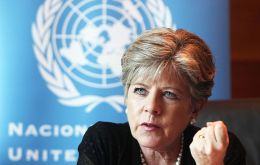
Tensions inside Mercosur can be attributed to the fact that Argentina, Brazil, Paraguay and Uruguay share a development “economic model” which distances them from Venezuela, and are prepared to advance in trade negotiations with the European Union, and even with the Pacific Alliance. Venezuela on the other hand has as its main priority putting the deteriorated economy back on the growth track, according to the UN regional economic commission ECLAC, chair Alicia Barcena.
-
Thursday, October 13th 2016 - 14:52 UTC
Latin America and Caribbean will suffer 0.9% contraction this year but growth will reach 1.5% in 2017

The Economic Commission for Latin America and the Caribbean (ECLAC) has revised its economic growth projections for the region and now expects a 0.9% average contraction for Latin America and the Caribbean this year. Economic activity is expected to pick up in 2017 with average growth of 1.5%, according to a press release by the United Nations agency.
-
Monday, June 13th 2016 - 06:17 UTC
OAS General Assembly: a statement on Falklands/Malvinas can be expected
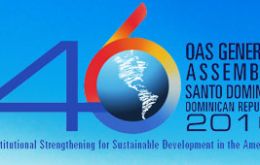
This Monday evening the Organization of American States 46th General Assembly will officially open in Santo Domingo and this year's convening agenda refers to “Institutional Strengthening for Sustainable Development in the Americas”. The two day gathering is also expected to focus on the Venezuela, Haiti and the Inter-American Human Rights Commission situations, and as is the norm, the Falklands-Malvinas issue will be addressed or included in the final declaration.
-
Monday, April 11th 2016 - 06:05 UTC
ECLAC anticipates minus 1.9% contraction in economic activity this year in South America

Latin America and the Caribbean are forecast to have an average economic activity contraction of -0.6% during 2016, according to the latest release from the Economic Commission for Latin America and the Caribbean (ECLAC). This new estimate reflects that the contraction experienced by regional Gross Domestic Product (GDP) in 2015 (-0.5%) will extend to the current year.
-
Monday, April 11th 2016 - 05:46 UTC
Argentina ready to formally join the IMF fold; Prat-Gay to meet Lagarde this week

Argentina will start discussions with the International Monetary Fund (IMF) this week on its first Article IV review in a decade, Finance Minister Alfonso Prat Gay said at a conference held by the Institute of International Finance (IIF) in Nassau. “Next week we are going to have a discussion (with the IMF) to agree on an actual schedule for the next Article IV evaluation, which will happen sometime around September,” Prat Gay told the audience on Sunday.
-
Wednesday, March 16th 2016 - 07:24 UTC
Latin American fiscal weakness and lack of 'tax culture' addressed in ECLAC forum

Evasion is one of the main weaknesses of the tax systems in the Latin America and the Caribbean economies, accounting for 320 billion dollars in 2014 - according to the Fiscal Panorama of Latin America and the Caribbean 2016, launched by the UN regional office, ECLAC, in Santiago de Chile.
-
Friday, December 18th 2015 - 07:55 UTC
South America to contract 0.8% and Central America will expand 4.6% in 2016, says UN office
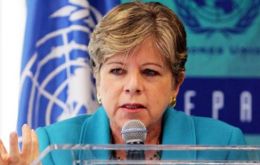
Latin American and Caribbean economies will contract 0.4% on average in 2015 and will grow just 0.2% next year, as a result of the complex external scenario, according to new projections unveiled on Thursday by the UN Latin America and Caribbean Economic commission, ECLAC. Estimates for next year are that Central America will expand 4.6% while South America will again contract 0.8%.
-
Thursday, October 22nd 2015 - 07:42 UTC
Latin America's 2013/15 exports, worst performance in eight decades says ECLAC
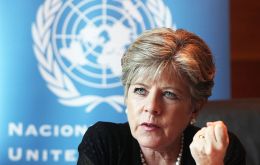
The value of Latin America’s exports will continue to decline through 2015 by 14%, with Argentina faring slightly worse with a reduction of 17%, says the UN Economic Commission for Latin America and the Caribbean (ECLAC) report, which also indicated that the value of imports to Argentina are set to fall by a smaller 10%.
-
Tuesday, July 14th 2015 - 06:07 UTC
Caricom considering ECLAC proposal to write-off its multilateral debt

The Caribbean Community, Caricom is considering a proposal for the region to pursue gradual write-off of its multilateral debt as a means of economic prosperity. The debt relief strategy was put forward by Alicia Barcena from the Economic Commission of Latin America and the Caribbean (ECLAC), at the 36th Regular Meeting of the Heads of Government of the Caribbean Community, held in Barbados.
